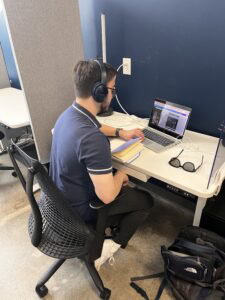
Networking is often perceived as a high-energy, fast-paced activity suited for extroverts who thrive on social interaction. However, for introverts, the thought of mingling at events or striking up conversations in coworking spaces can feel overwhelming. The good news? Networking doesn’t have to be forced or draining.
In this guide, we’ll explore how introverts can navigate coworking spaces and events to build genuine connections without feeling awkward or exhausted. From leveraging structured interactions to using online networking tools, these tips will help transform networking from a dreaded task into an empowering opportunity.
Why Networking Matters for Introverts
Networking isn’t just about collecting business cards or adding connections on LinkedIn. It’s about creating meaningful relationships that can open doors to opportunities, collaborations, and professional growth. Research indicates that up to 85% of jobs are filled through networking (LinkedIn, 2022), making it a crucial skill for career and business success.
For introverts, networking can also:
- Help build confidence in professional settings.
- Provide mentorship and learning opportunities.
- Open doors to business partnerships and job prospects.
- Foster a sense of community, especially in coworking spaces.
With the right approach, networking can feel authentic and fulfilling rather than overwhelming.
Understanding Your Strengths as an Introvert
Many introverts mistakenly believe that networking requires extroverted traits such as being loud, outgoing, or charismatic. In reality, introverts bring unique strengths to networking, including:

- Deep Listening: Introverts excel at meaningful conversations because they listen intently rather than just waiting for their turn to speak.
- Thoughtful Connections: They build quality relationships rather than focusing on quantity.
- Empathy & Understanding: Their ability to observe and reflect makes them great at reading people’s needs and finding common ground.
- Strategic Thinking: Introverts prefer purpose-driven interactions, making networking more intentional and effective.
Embracing these strengths can help introverts reframe networking as a tool for growth rather than an exhausting social obligation.
Practical Networking Strategies for Introverts

1. Choose the Right Environment
Not all networking opportunities are created equal. As an introvert, it’s important to select settings that align with your comfort level and allow for structured, meaningful conversations. Some ideal networking environments include:
- Coworking spaces – Places like Pillar Cowork offer natural, low-pressure networking opportunities.
- Small group events – Workshops, panel discussions, and mastermind groups offer organic ways to connect without the stress of large networking events.
- Online networking – LinkedIn, industry-specific Slack groups, and virtual meetups let you engage without in-person pressure.
2. Prepare Ahead of Time
Introverts tend to overthink interactions, but preparation can help ease nerves. Before attending an event, take these steps:
- Research attendees – Check LinkedIn, event guest lists, or coworking directories to identify potential connections.
- Prepare conversation starters – Keep a few go-to questions in mind, such as:
- What brought you to this event?
- What’s a recent project you’re excited about?
- Have you worked in a coworking space before?
- Set small, achievable goals – Instead of pressuring yourself to meet everyone, aim to connect meaningfully with 2-3 people.
3. Leverage One-on-One Interactions
Instead of working the room, focus on deep, one-on-one conversations. Introverts tend to excel at meaningful discussions, so embrace that strength.
- Invite someone for a coffee chat after an event.
- Join smaller breakout groups during networking sessions.
- Follow up via email or LinkedIn with a personalized message.
4. Use Non-Verbal Networking Tools
Networking isn’t just about talking! Utilize passive and digital tools to make connections:
- Wear conversation starters – A branded tote bag, a pin with your business name, or even a unique notebook can spark curiosity.
- Use LinkedIn QR codes – Instead of exchanging business cards, share your LinkedIn profile using a scannable QR code.
- Join coworking community boards – Many coworking spaces have member directories or Slack channels where you can introduce yourself digitally first.
5. Engage in Structured Networking
Structured networking activities take the pressure off introverts by providing clear expectations. Try:
- Speed networking – Quick, timed conversations can be easier than open-ended mingling.
- Coworking meet & greets – If you work in a coworking space, join scheduled member introductions.
- Speaking engagements – Leading a short presentation or workshop can position you as an expert without requiring direct networking.
6. Follow Up with Intent
The most effective networking happens after the event. Instead of worrying about making an impression in the moment, focus on solidifying connections afterward:
- Send a short LinkedIn message: “It was great meeting you at [Event Name]. I’d love to stay in touch and hear more about your work!”
- Offer a reason to reconnect: “I remember you mentioned [Topic]. I came across this article and thought you might find it interesting!”
- Stay engaged in online communities: Comment on LinkedIn posts or contribute to industry Slack groups to stay visible without constant social interaction.
The Power of Coworking for Introvert-Friendly Networking

Coworking spaces are ideal for introverts who want to network naturally. Instead of forced interactions, coworking allows you to build relationships over time through shared workspaces, communal areas, and casual coffee chats.
- Dedicated desks – Provide a personal space while still offering community access.
- Coworking memberships – Allow flexible interactions without the commitment of a private office.
- Community events – Offer structured, low-pressure networking opportunities.
If you’re considering coworking, check out this guide to see what option fits you best!
Networking Doesn’t Have to Be Draining
Networking as an introvert doesn’t mean pretending to be an extrovert. By leveraging your natural strengths, choosing the right environments, and using strategic tools, you can build genuine connections without feeling exhausted.
Instead of seeing networking as a high-energy performance, shift your mindset to meaningful conversations. Whether through coworking spaces, online communities, or structured events, introverts can thrive in networking—without the awkwardness.

